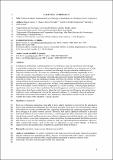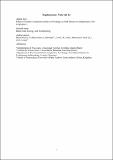Files in this item
Effects of indirect reputation and type of rearing on food choices in chimpanzees (Pan troglodytes)
Item metadata
| dc.contributor.author | Bueno-Guerra, Nereida | |
| dc.contributor.author | Colell, Montserrat | |
| dc.contributor.author | Call, Josep | |
| dc.date.accessioned | 2021-06-05T23:46:21Z | |
| dc.date.available | 2021-06-05T23:46:21Z | |
| dc.date.issued | 2020-06-06 | |
| dc.identifier | 268723680 | |
| dc.identifier | 554927a6-7f3a-4f6a-abd6-c80c2f44b95b | |
| dc.identifier | 85086015568 | |
| dc.identifier | 000540456500003 | |
| dc.identifier.citation | Bueno-Guerra , N , Colell , M & Call , J 2020 , ' Effects of indirect reputation and type of rearing on food choices in chimpanzees ( Pan troglodytes ) ' , Behavioral Ecology and Sociobiology , vol. 74 , no. 6 , 79 . https://doi.org/10.1007/s00265-020-02861-w | en |
| dc.identifier.issn | 0340-5443 | |
| dc.identifier.other | ORCID: /0000-0002-8597-8336/work/76387036 | |
| dc.identifier.uri | https://hdl.handle.net/10023/23316 | |
| dc.description | This study was funded by a FPU12/00409 scholarship from the Ministry of Education of Spain granted by NBG. | en |
| dc.description.abstract | Chimpanzees and humans establish preferences over individuals they may benefit more from through scoring indirect reputation. However, humans prefer prosocial individuals even at their own cost. Giving preference to prosocial reputation over material rewards might have permitted the establishment of cooperative human societies. We tested the evolutionary roots of this propensity: importantly, in our study, the reputation scored had no food involved. Eighteen chimpanzees watched a performance where an antisocial experimenter hit a human victim and a prosocial experimenter interrupted the fight and consoled the victim. Next, the chimpanzees begged food from one of them. In Phase 2, the experimenters offered different food amounts (antisocial + 4 vs. prosocial + 1). Chimpanzees significantly prioritized rewards over reputation (i.e., chose antisocial). In Phase 3, both experimenters offered two pieces of food. Most of the subjects showed indifference to reputation (i.e., chose randomly). Watching fights produced significantly more arousal than consolations. Emotional engagement could not account for chimpanzees’ choices since their choices varied between phases but their arousal did not. Ontogeny and rearing history might play a role in chimpanzees’ choices: the adolescent males (n = 3) consistently chose the antisocial individual whereas hand-reared subjects chose significantly different from mother-reared. We discuss whether the valence of the reputation is species-specific. | |
| dc.format.extent | 611362 | |
| dc.format.extent | 711571 | |
| dc.language.iso | eng | |
| dc.relation.ispartof | Behavioral Ecology and Sociobiology | en |
| dc.subject | Chimpanzees | en |
| dc.subject | Image scoring | en |
| dc.subject | Morality | en |
| dc.subject | Rearing | en |
| dc.subject | Reputation | en |
| dc.subject | Ecology, Evolution, Behavior and Systematics | en |
| dc.subject | Animal Science and Zoology | en |
| dc.subject | DAS | en |
| dc.title | Effects of indirect reputation and type of rearing on food choices in chimpanzees (Pan troglodytes) | en |
| dc.type | Journal article | en |
| dc.contributor.institution | University of St Andrews. School of Psychology and Neuroscience | en |
| dc.contributor.institution | University of St Andrews. Centre for Social Learning & Cognitive Evolution | en |
| dc.identifier.doi | 10.1007/s00265-020-02861-w | |
| dc.description.status | Peer reviewed | en |
| dc.date.embargoedUntil | 2021-06-06 |
This item appears in the following Collection(s)
Items in the St Andrews Research Repository are protected by copyright, with all rights reserved, unless otherwise indicated.


